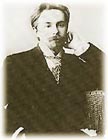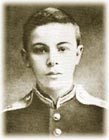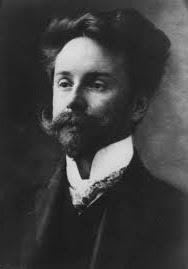Alexander Scriabin (7 Jan 1872 – 27 Apr 1915): Ecstasy and Light
BIOGRAPHIES, 22 Jun 2015
René Wadlow – TRANSCEND Media Service
 27 April 2015 marked the 100th anniversary of the death of the Russian composer Alexander Scriabin who believed that music had the power to elevate the consciousness of people and therefore to transform social conditions. Scriabin is often described as a “mystic”, but there is no direct evidence that he personally had mystic experiences. Rather he drew upon the works of theosophical writers and conversations with people in the theosophical milieu in London and Bruxelles. 27 April 2015 marked the 100th anniversary of the death of the Russian composer Alexander Scriabin who believed that music had the power to elevate the consciousness of people and therefore to transform social conditions. Scriabin is often described as a “mystic”, but there is no direct evidence that he personally had mystic experiences. Rather he drew upon the works of theosophical writers and conversations with people in the theosophical milieu in London and Bruxelles.
[Watch on TMS Music Video of the Week Scriabin’s Mysterium] Alexander Scriabin was a key figure of what is commonly called the Silver Age in Russian history from the 1890s to 1914 . The start of the First World War followed by the Russian Revolution dispersed many of the groups which had been active in Moscow and St. Petersburg. The Silver Age had seen a surge of interest in various forms of mysticism, the occult and the philosophical teachings of India and China along with influences from Germany: the thought of Nietzsche and the Christianized version of theosophy developed By Rudolf Steiner. Rudolf Steiner’s second wife, Marie von Sivers was a Baltic Russian who also helped spread Steiner’s views in Helsinki and Warsaw, cities in close contact with Russian intellectual circles.
Scriabin came from an aristocratic Russian family. His father was a Russian diplomat usually posted abroad and who had little contact with his son. Scriabin’s mother was a well-known concert pianist but who died when Scriabin was only one year old. Thus he was raised by his father’s sister and mother, both of whom were musicians. As Scriabin showed that he had an interest and a talent for music, he started to learn the piano at an early age with a teacher who was also teaching Sergei Rachmaninoff. The two students became life-long friends, Rachmaninoff doing much to introduce Scriabin’s piano work after Scriabin’s early death at the age of 43. Scriabin had followed the classic Russian path for musicians going to the Moscow conservatory, and at an early age, he married another young pianist, Vera Ivanova Isakovich. As many Russians of that time and social class, they decided to travel abroad, and so from 1904 to 1909, they lived in Paris, and spent time in London, Bruxelles, and the USA. In 1907 in Paris, Scriabin collaborated with the producer Sergei Diaghilev to introduce Russian music, dance and art to the French artistic milieu. Scriabin found time to produce four children with his wife, as well as taking a second “wife” Tatyana Schloezer. Finally Vera agreed to a divorce and Tatyana became a legal wife. They had three children. In addition to music, Scriabin believed that sex was an avenue to secret knowledge. At the time in theosophical circles there was a good deal of interest in the awakened kundalini,the serpent fire, said to be coiled at the base of the spine. With proper breathing exercises and meditation, the serpent can rise up to the “Third Eye” between the brows and then to the crown of the head producing enlightenment and liberation from matter. Scriabin took yoga breathing exercises to work with the kundalini . One problem, and not only with Scriabin, is that the fire rises from the base of the spine only as far as the sex organs and stays there. Later, in the 1930-1940 period when Scriabin’s music was considered not to be in line with “Socialist Realism” it was attacked for “its unhealthy eroticism” and Scriabin’s life was given as proof that his music stimulated sex and took the workers minds off production goals. With the fast declining birth rate in Russia, there seems to be a strong revival of interest in Scriabin’s music. One of Scriabin’s most explicit theosophical-spiritual compositions, following the concepts put forward in Blavatsky’s The Secret Doctrine is Prometheus: Poem of Fire. In the usual account of the Prometheus myth, Zeus has Prometheus make humans out of mud. Prometheus takes pity on the conditions of the creatures he created and steals fire from heaven and gives it to them. Zeus punishes Prometheus by having him bound to a rock, but eventually he is freed by Hercules. In the theosophical retelling which Scriabin uses, Prometheus does not steal the fire but is given it consciously by Zeus to produce “the ray of light” in humans. Thus Prometheus is like Lucifer, the “light bringer” who brings to the mind the capacity to understand the causes of progress and regression. Zeus does not “punish” Prometheus; rather being bound to a rock is a symbol of the difficulties on the spiritual path, the progression of Spirit through Matter to return liberated as Spirit but at a higher degree of evolution at the end of the cycle than at the beginning.(1) In the Soviet Union and even in today’s Russia, Scriabin’s music has been treated as music largely separate from his philosophical ideas. In 1922 at the end of the Civil War when the Soviet government could start thinking about culture, the Moscow apartment of Scriabin was created as a state museum and kept in the condition in which he lived, with the esoteric knowledge books visible in the library. Except for the 1930-1940 period of the hardest moments of Stalin’s cultural repression, Scriabin’s music has been played. When Gagarin was in his spacecraft, the Russian Radio sent up the music of Scriabin’s Poem of Ecstasy which became the “theme song” when Gagarin landed. As is often the case, esoteric knowledge remains esoteric. The spiritual foundation of Scriabin’s music is no longer unknown in Russia but is not stressed either. With a knowledge of the spiritual quest, one can hear his music with different ears. Note: 1) For a theosophical assessment of Scriabin’s music, see Cyril Scott. Music: Its Secret Influence Throughout the Ages (New York: Samuel Weiser Inc, 1958) |
_________________________________
René Wadlow, a member of the Fellowship of Reconciliation and of its Task Force on the Middle East, is president and U.N. representative (Geneva) of the Association of World Citizens and editor of Transnational Perspectives. He is a member of the TRANSCEND Network for Peace, Development and Environment.
This article originally appeared on Transcend Media Service (TMS) on 22 Jun 2015.
Anticopyright: Editorials and articles originated on TMS may be freely reprinted, disseminated, translated and used as background material, provided an acknowledgement and link to the source, TMS: Alexander Scriabin (7 Jan 1872 – 27 Apr 1915): Ecstasy and Light, is included. Thank you.
If you enjoyed this article, please donate to TMS to join the growing list of TMS Supporters.

This work is licensed under a CC BY-NC 4.0 License.


[…] biographical article on TMS: ‘Alexander Scriabin: Ecstasy and Light,’ by René […]
[…] Alexander Scriabin (7 Jan 1872 – 27 Apr 1915): Ecstasy and Light […]